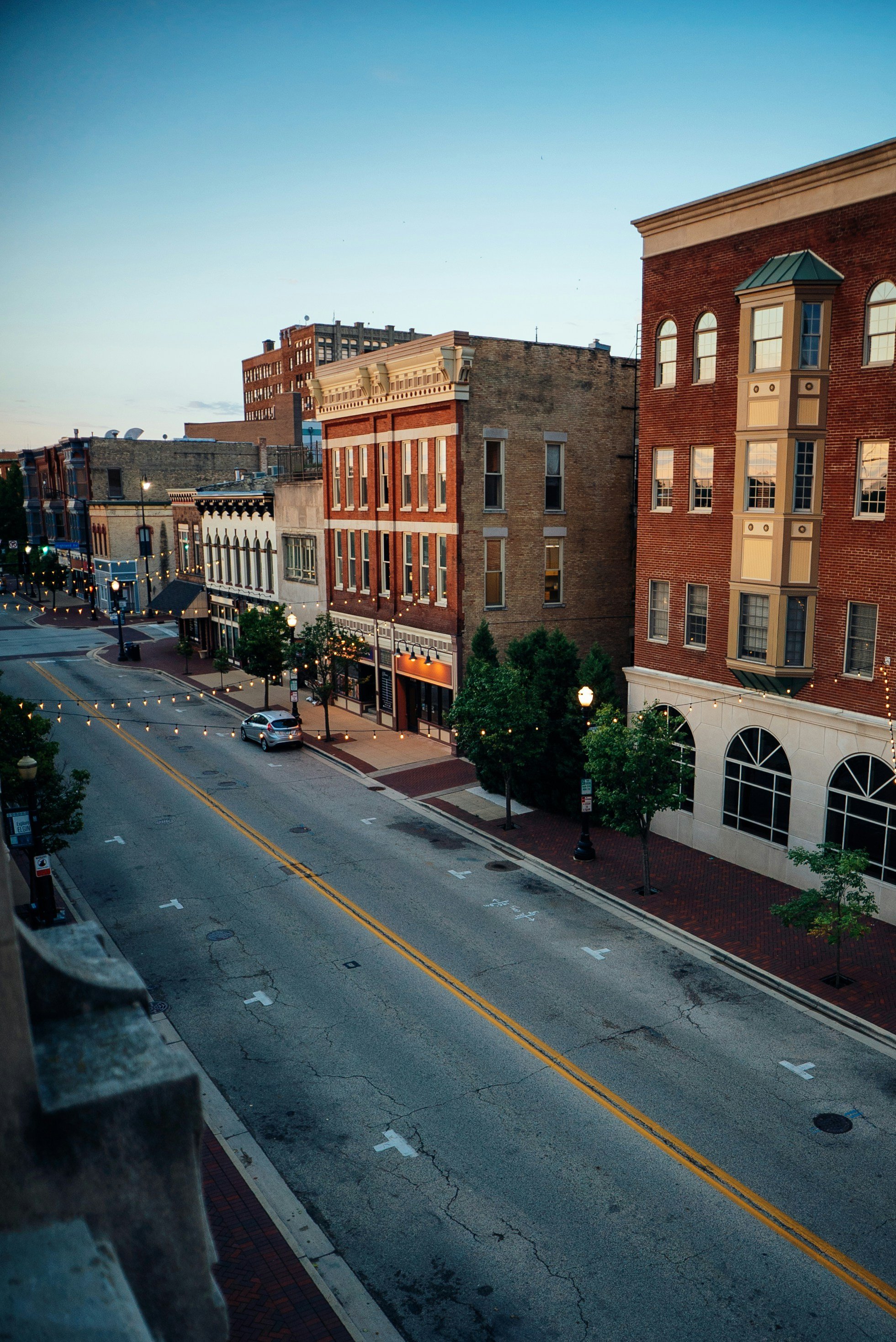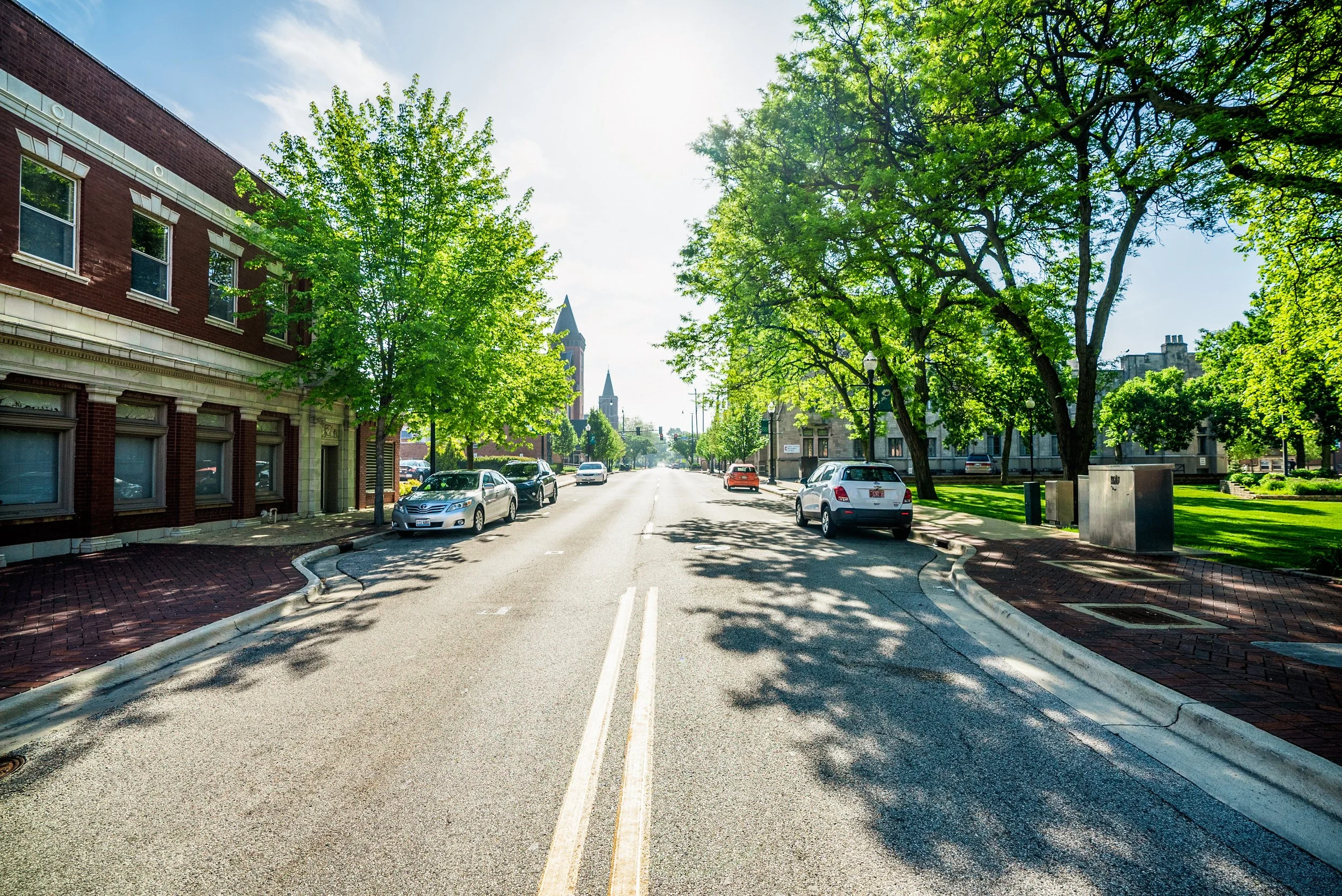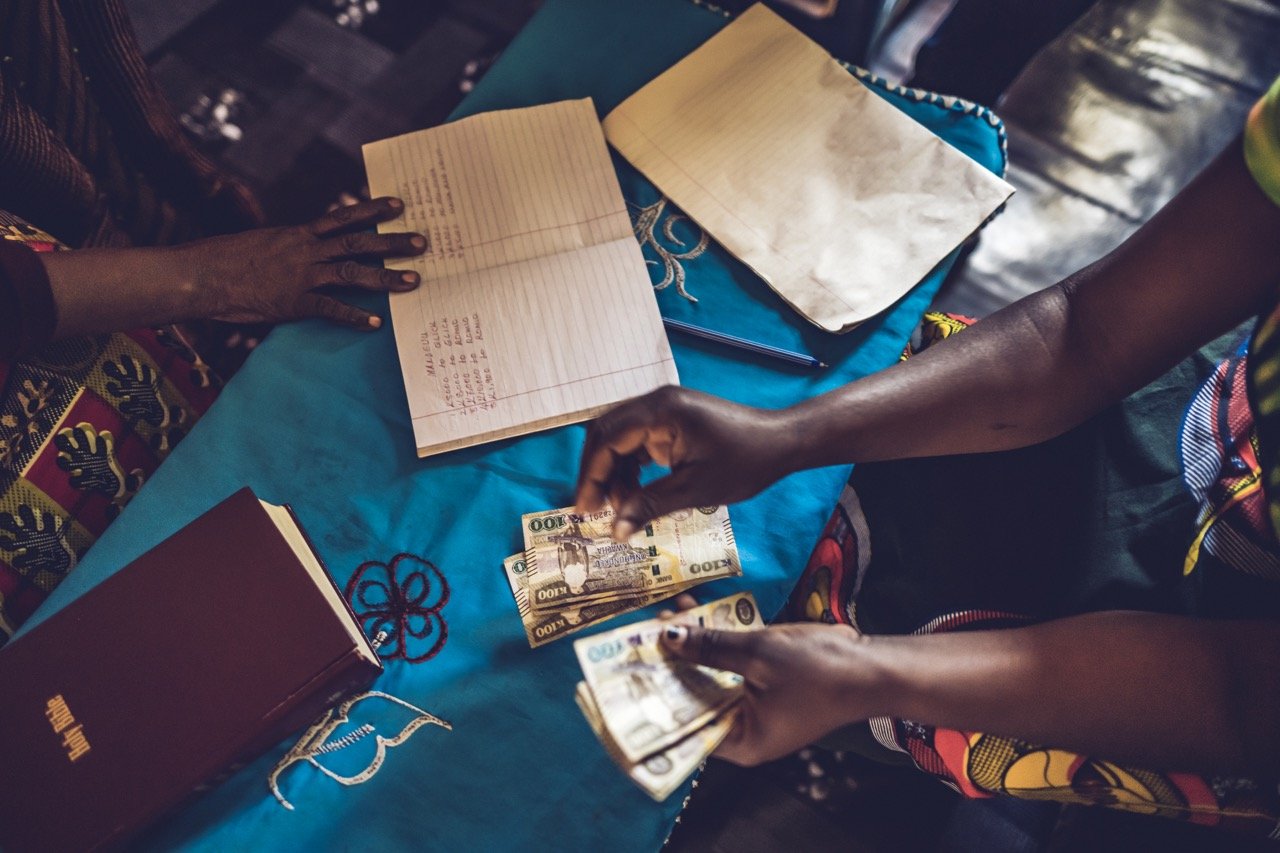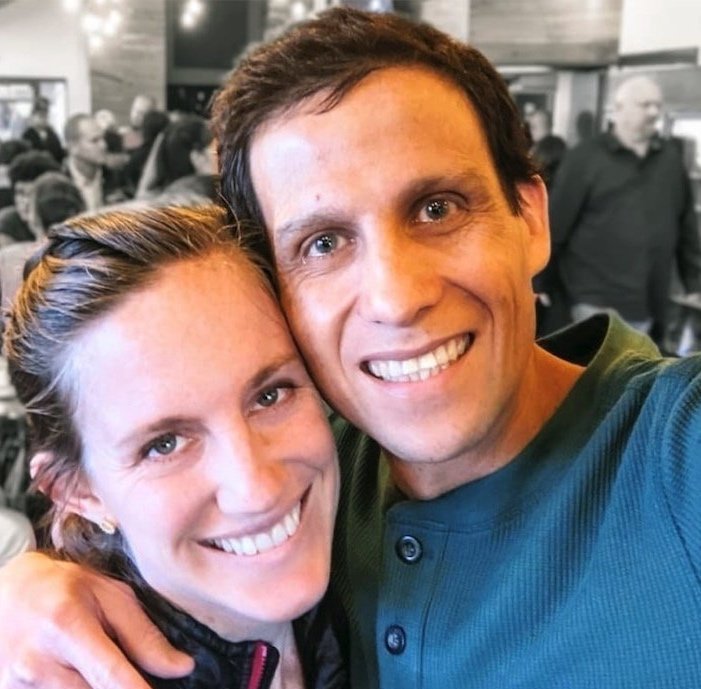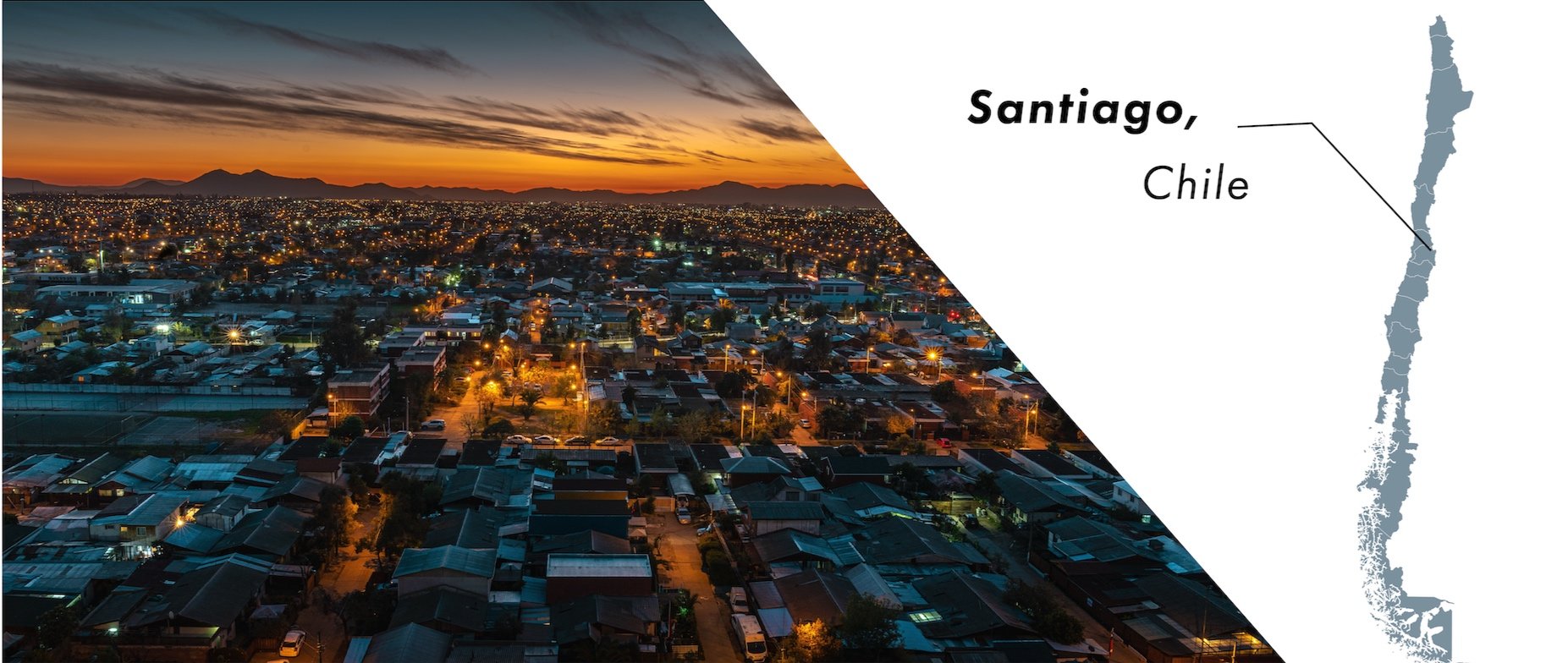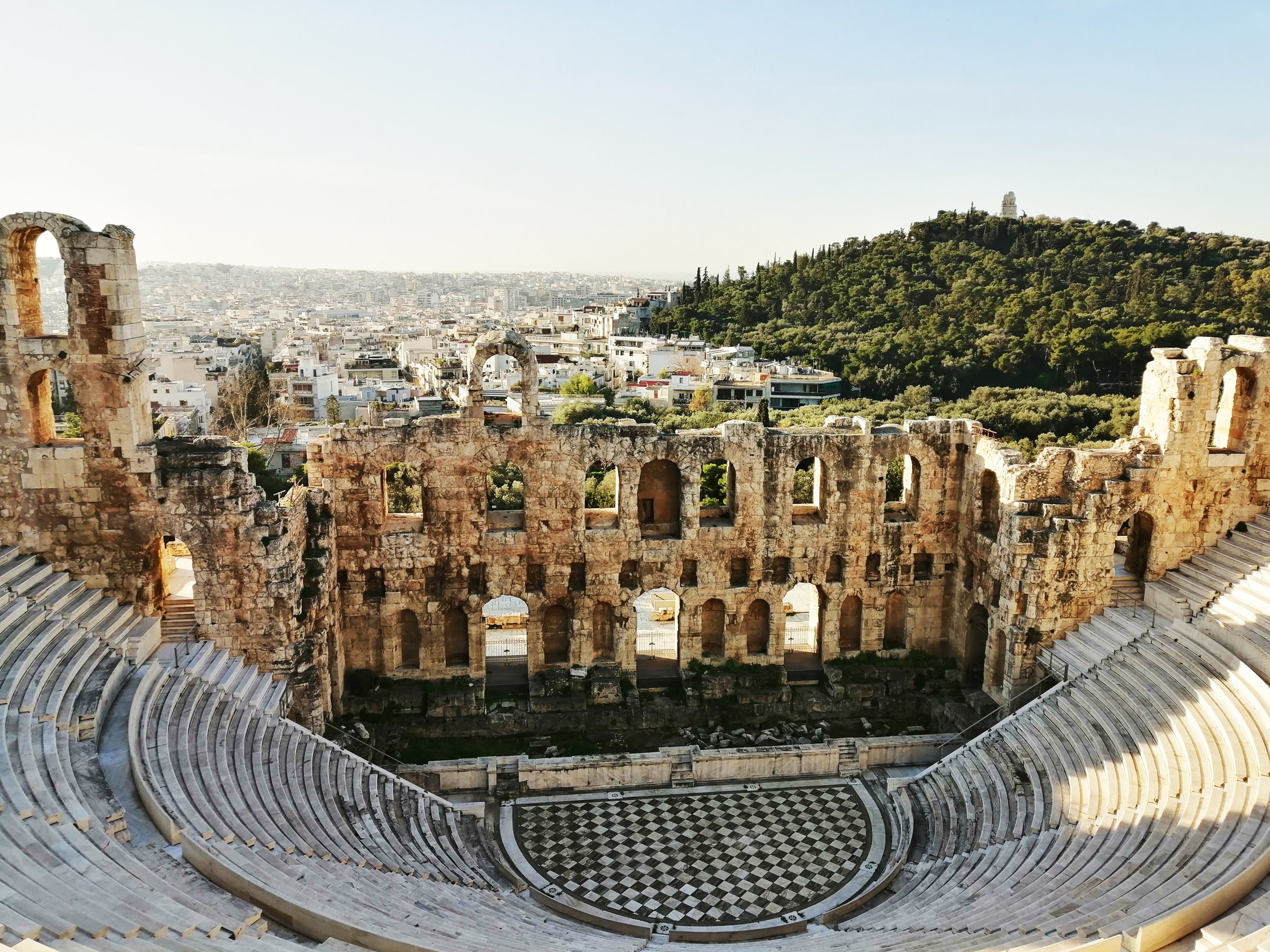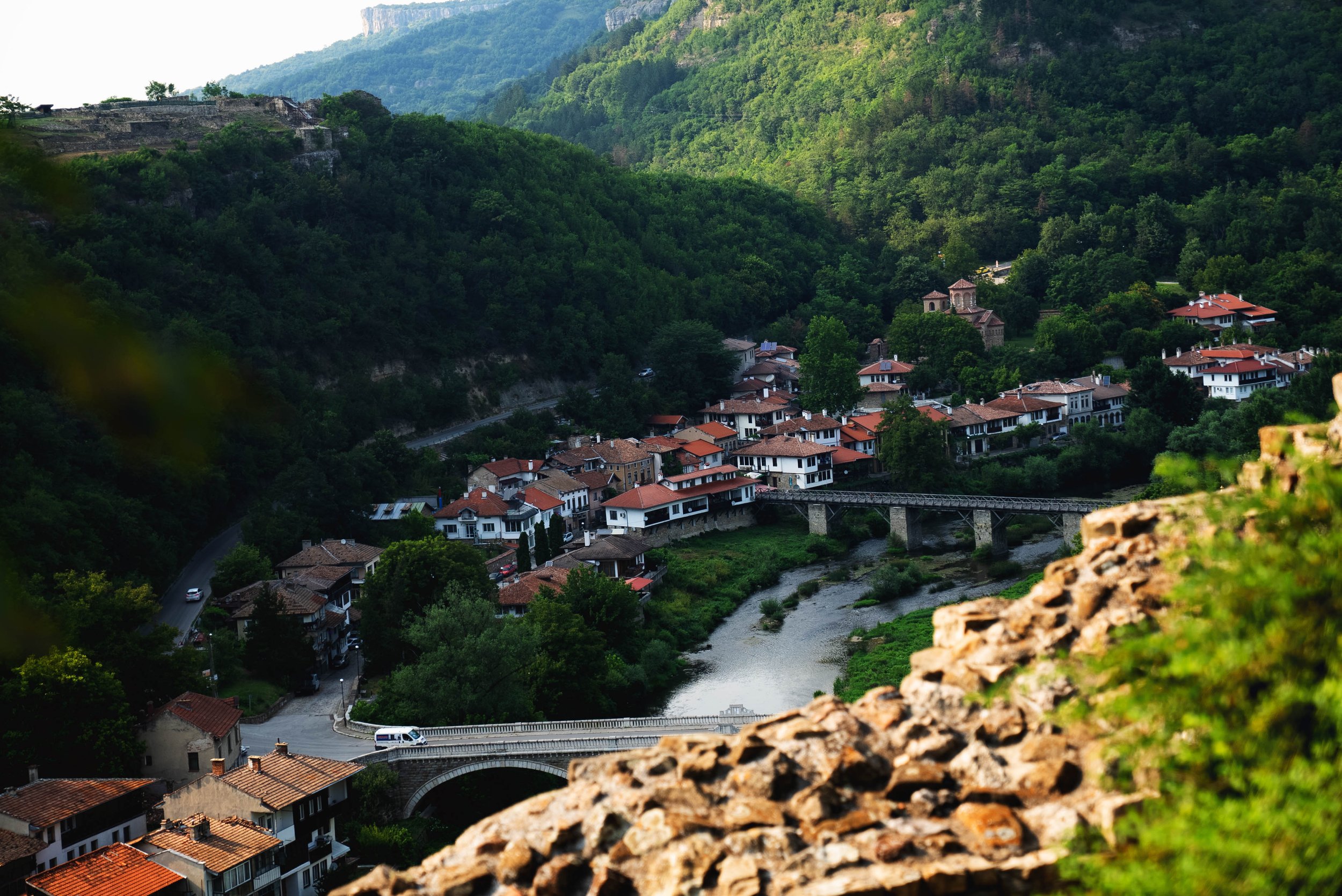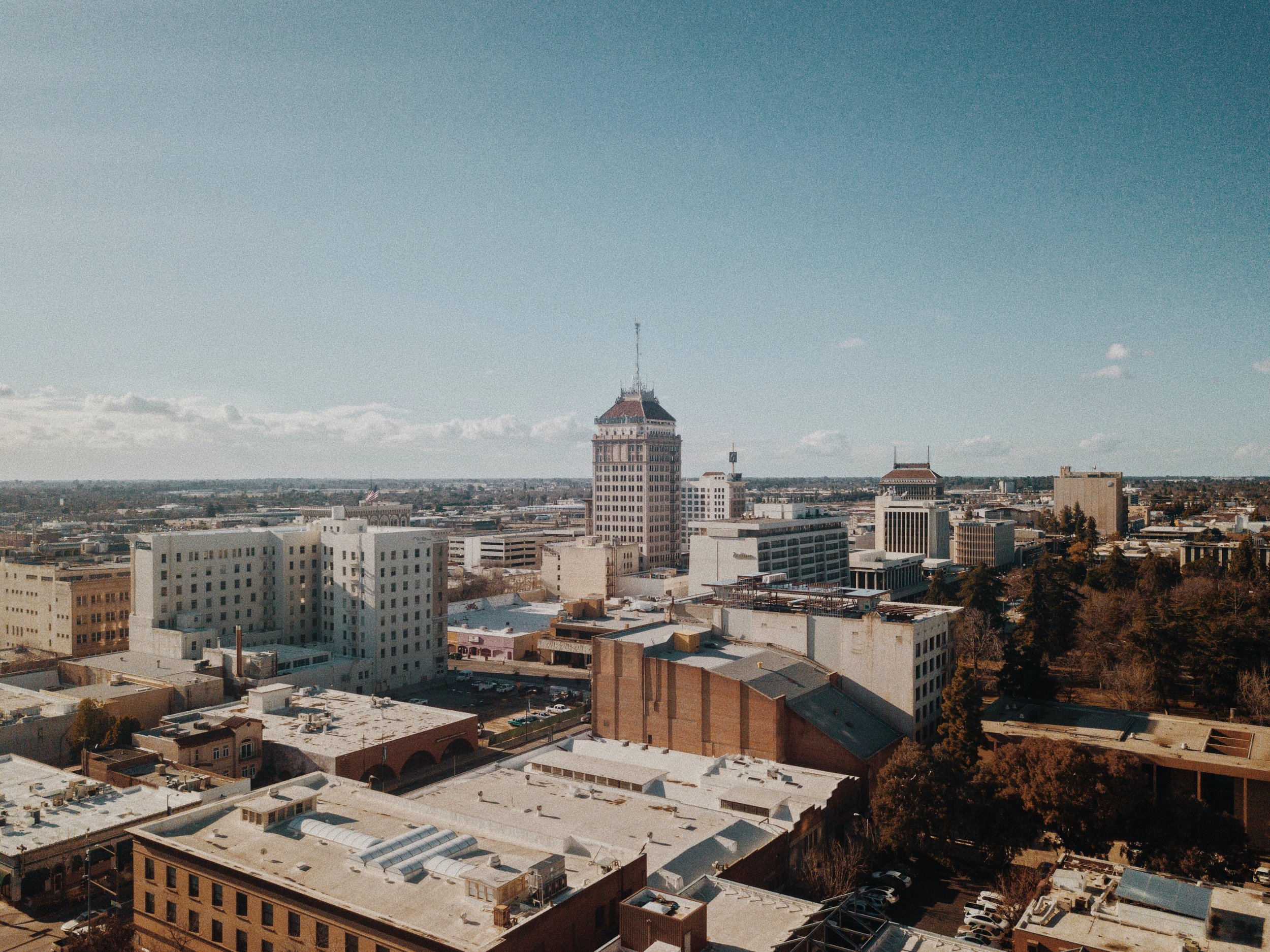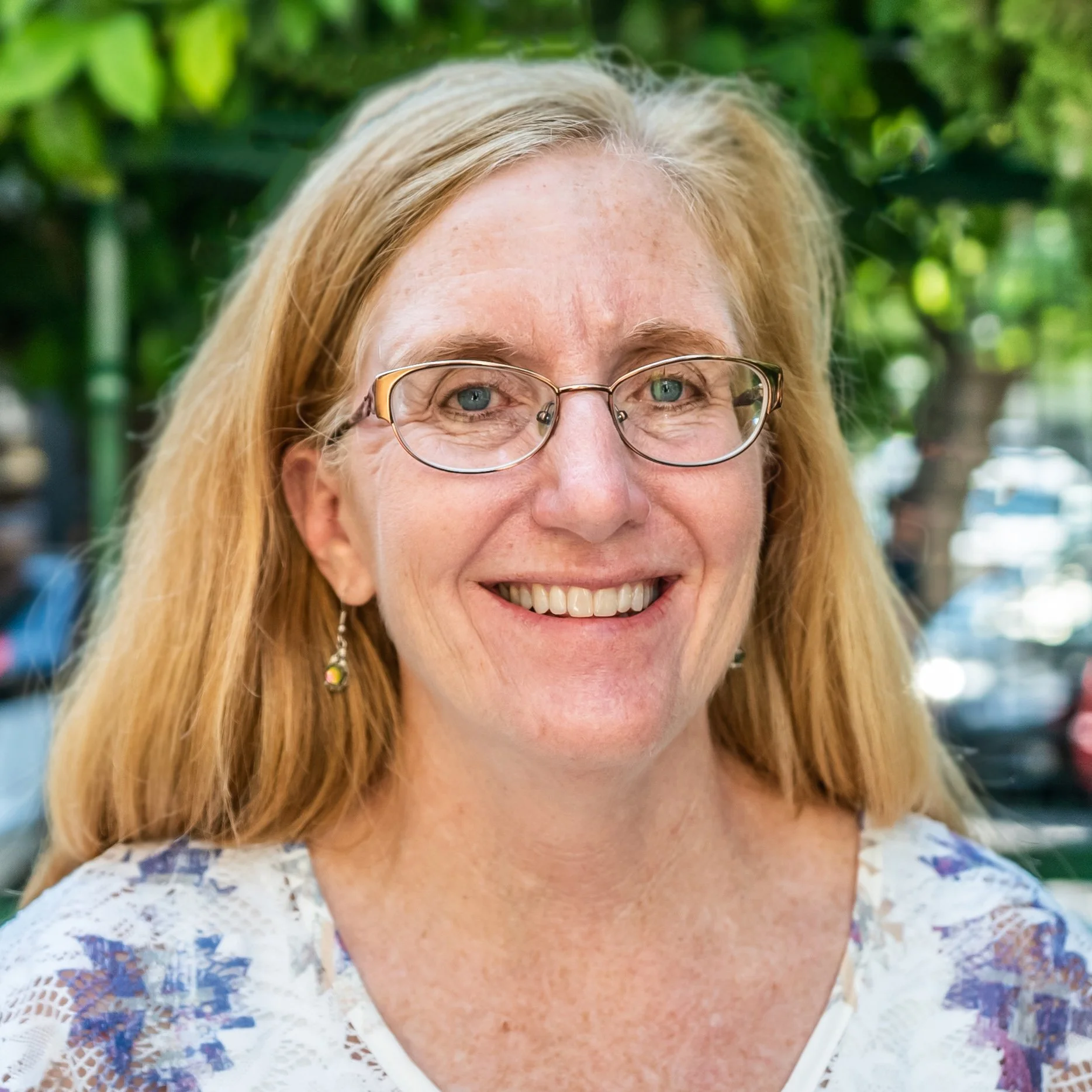Getting People in the Same Room
Getting People in the Same Room
In Elgin, Illinois
In Elgin, ILlinois, usa
Bobby jackson
Elgin, Illinois
Bobby Jackson and his family have lived in Elgin, Illinois for over 10 years - and in 2019, he joined One Collective as a Catalyst for Elgin. With a passion to do more than simply manage long-standing problems, Bobby resonated with the idea of bringing locals together to determine long-term solutions for existing problems. Four years later, he continues to see the result of bringing people together.
“Our team is made up of collaborators - we focus on bringing people together to solve problems. There are a lot of great organizations in Elgin, but for a long time, they didn’t talk to each other, which resulted in many resource ‘gaps’. I’ve found that different groups don’t instinctively put their resources together in ways that would be mutually beneficial. As a result, much of what I do is simply creating spaces where people can have conversations that build trust and establish relationships to solve problems.”
One long-standing problem in Elgin is chronic homelessness. To address this issue, the team in Elgin has hosted countless initiatives bringing together existing nonprofits and agencies, churches, and local governmental officials.
Through these facilitated spaces, a collaborative case management team across local organizations has been established, multiple city- and county-wide summits have been held on the topic of housing, homelessness, and affordable housing, and previously unknown streams of funding have been found. Perhaps most importantly, it has led to a shared community-wide plan to not just manage, but end homelessness.
“I’ve seen the power of people simply being in a room together. It has resulted in 16 organizations meeting every two weeks to talk through each unsheltered individual that needs assistance along the continuum of care. It has resulted in us hosting a housing and homelessness summit for over 40 agencies, churches, etc - and the county officials who attended finding it so useful that they took it over and now hold it semi-annually. And these types of meetings recently resulted in four attendees developing a relationship and applying for a grant together and winning it - receiving over 2 million dollars in funding from the state for food and housing for asylum seekers in Elgin.”
“I’ve seen the power of people simply being in a room together”
While the team in Elgin focuses on long-term solutions, they have also found a new way to meet a need that was falling through the cracks: a winter shelter for people who live on the streets.
“The winter shelter is our newest initiative, and while it’s not the long-term solution, it is born out of meeting a tangible need and our community relationships. There is a local church that was previously hosting a winter shelter for the past few years, and it had to take a step down from doing so because it was too much for their church to sustain alone.
Our team recognized that, since we’re collaborators and have relationships with many churches in the area, we could figure out a way to do this in a sustainable fashion.”
“Winters here are brutal, and the reality is that unsheltered and houseless people will freeze to death if they don’t have a warm place to stay. Our vision is to have the shelter open every night and be able to coordinate volunteers and funding from over 10 churches in the area.”
“Alex, our housing and homelessness coordinator, has been the main person overseeing and coordinating volunteers, and running the shelter himself. He grew up in this area, and now he’s giving back and serving the community. He’s pouring his life into others. On top of this, we are contracting a woman who is currently living on the streets to help run the winter shelter - creating more of a sense of self-governance.”
“We are strong believers in self-governance and raising people to be their own agents of rescue - raising people from the demographic we serve to serve their peers. At other shelters, this woman would typically just be a client of the shelter, but instead she’s staying up and helping with registration, check in, check out, clean up, etc. Alex first identified her, and is now focused on equipping her to succeed.”
Alex Madrid
Elgin, Illinois
Alex shares, “In running the shelter, we wanted to establish a culture of respect right away. In other shelter setups, people’s bags are often searched, or they go through a metal detector, etc. With this shelter, we’re not doing that - we’re choosing to trust people and promote dignity.”
“We don’t want to violate their space simply because they need a warm place to sleep.”
“What we do instead is ask for mutual respect - and it’s been encouraging so far to see people give that mutual respect - both volunteers and people who are coming to sleep at the shelter.”
“The goal of this shelter is not simply to complete a task, but to build and create space for relationships. I’ve had multiple people come up to me and start sharing their hearts and stories with me, just because I’ve made an effort to learn their names and ask how they’re doing. It’s been so encouraging to see that level of relationship and trust being built come out of meeting a very practical need. And I couldn’t imagine doing anything else.”
“Looking to the future beyond the winter shelter,” Bobby notes, “I’m most excited about getting closer to zero people homeless.”
“The winter shelter is an important immediate focus because it brings the city closer to zero people out in the cold on their own, and also offers us more relational currency and trust from others that we practice what we preach.”
“One of the things our team prioritizes differently from everyone else though is our metric of success. Every other organization works to serve more people impacted by the problem. We work to solve the problem at its core.
Our goal is not to serve 50 people this week and 60 next week - our goal is to serve 40 people next week because we found long-term housing solutions for 10 people. That’s a very different approach than other organizations who are trying to grow their reach in terms of people served. If your model is only based on the number of individuals served, then you are not incentivized to find housing for them. I love that part of what we do - we’re not here to simply serve more people, we’re here to solve problems collaboratively, and make the overall lives of people better.”
“Ultimately, my vision is to get to the point where in Elgin, we’re known for something like economic development instead of homelessness - because we’ve solved homelessness and no longer need to focus on it.”
The ongoing developments surrounding homelessness in Elgin is one example of deep, long-term, transformative impact that sends ripples across a community. Your support is part of what empowers this work to continue happening - in Elgin and throughout the world. Thank you!
Setting the Stage for Lasting Change
Setting the Stage for Lasting Change
In Chibolya, Zambia
In chibolya, Zambia
Ben and Kristen Choitz
Chibolya, Zambia
Six years ago, when Ben and Kristin moved to the village of Chibolya, Zambia, they quickly observed the spiritual, economic, and physical challenges facing the community.
At the same time, they also saw great potential.
Through Ben’s role as a Catalyst, they began their work by getting to know people in this community of 4,500 people, and over the next few months identified several challenges locals faced - poor education, joblessness, lack of clean water - as well as existing resources. One prominent challenge that emerged was a lack of resources specifically for women.
“For many women in the community,” Ben observed, “prostitution is the only option that allows a woman to earn a living. You’re born in a place and it’s the only way you know to survive. You have no choice.”
“I saw the abuse,” says Kristin. “I would go out into the town each night seeking to engage these women who felt prostitution was their only means of support – the only way they could make a living.”
Coming alongside the women of Chibolya quickly became an area of focus, and Ben and Kristin explored methods to tangibly provide opportunities for women to create sustainable streams of income outside of prostitution. “I began establishing long-term relationships with local women. I offered regular Bible study groups, mentoring, and options that offered training and skills towards establishing sustainable livelihoods.” Kristin shares.
One initiative that emerged from this has been an ongoing women’s empowerment program.
This program provides business and entrepreneurial training, as well as skill development in budgeting, leadership, and long-term planning for vulnerable women. With principles from Scripture as a foundation, this program not only provides an answer to the question of “how”, but goes deeper to the “why” - and has paved the way for relationships to grow beyond the program itself.
Throughout the past five years of this program’s existence, women who otherwise didn’t see a future beyond prostitution have learned to lean into their strengths, grow in self-awareness, and contribute to the economic growth of Chibolya.
Sylvia is a woman who completed the program last year.
As a single mother with six children, it often felt like the cards were stacked against her. But in the midst of illness and poverty, Sylvia persevered.
She has a unique gift – baking muffins – which she has now turned into a successful business as a result of having completed the women’s empowerment program. She is now able to pay the school fees for all her children, and freely shares her secrets of success with other women in the community – offering them hope and prayer for a brighter future.
This program has proven to be successful, durable, and long-lasting – a true testament to the transformational work being done in Chibolya and the support and generosity of trusted friends and donors. Instead of competing with other locally driven initiatives, it has complemented them.
Ben and Kristin couldn’t do this work alone. They have also observed older, more mature women in the community taking an active role in reaching out to the younger women.
Often with experiences shaped by hardship, these women help to guide each other, teaching them to have self-respect and self-worth. They joined in the mentoring process offering the younger women an alternative way to live.
As Ben and Kristin’s work has continued to expand, they began to realize a central gathering place was needed to serve as a hub - a place to host business trainings and discipleship courses, to provide a safe place where community members could meet, learn, relax, and pray, and to be a central, consistent location for coming together.
In an answer to prayers for the right space - in March of 2022 a building was purchased and offered as a place where this vision could become a reality!
Once fully refurbished and equipped, this ministry center will offer courses ranging from English as a second language to computer skills for local youth, as well as host the Women’s Empowerment Group.
In addition, there are plans for it to house a coffee shop, space for mentoring and Bible study groups, and outreach. As the work continues to expand, this building will offer a common meeting place for those from all over Chibolya.
Thanks to your generosity, this ministry center will be a reality by the start of the New Year!
Empowering Innovation that Transforms a Community
Empowering Innovation that Transforms a Community
In Buffalo City, South Africa
In buffalo city, south africa
Scott worley
Buffalo City, South Africa
When a problem builds up for generations, it can feel impossible to find lasting, sustainable solutions. How do you avoid settling for short-term fixes to long-term problems? How can you go deeper and disrupt those harmful cycles, to see a community truly transformed long-term through the ways of Jesus?
In Buffalo City, South Africa, a Catalyst - Scott - has been a key leader exploring how long-term change can take place in his community - and because of your support, he is implementing innovative solutions to employ young adults and teach them valuable skills for their future.
“Finding employment in South Africa has been difficult for over a generation. This remains one of the main problems the country faces today. Especially in impoverished communities, single mother households are the norm, putting youth at a disadvantage. Because it’s so hard to find a job, young adults get disillusioned and angry and it leads to all kinds of drug abuse, destructive activity, and crime.”
“One of the ways we’re working to change this is through piloting an entrepreneurial training program for young adults. Our ultimate vision is to roll this out specifically for youth in impoverished communities, and change this cycle. It’s a long-term solution that approaches the massive problem of unemployment by empowering mindsets to be changed and think outside the box.”
“What excites me the most is that this isn’t just about providing opportunities for young adults to create work for themselves or for others in the community - it also creates space to ask the important question of ‘How can I innovatively use my passion and purpose in life to make a living and bless my community?’ We’re not doing what we do just to have good programs. We want to empower mindsets to be changed and think outside the box.”
“We’re not doing what we do just to have good programs. We want to empower mindsets to be changed and think outside the box.”
This is an opportunity to invite as many people to the table as we can who have traditionally been divided - government, private enterprises, and individuals. There’s such diversity in South Africa, and great potential for this generation to create an integrated South Africa. These teenagers can lead the way - and your support is what empowers this to take place, through innovation and through the ways of Jesus.”
Rebuilding Hope Together
Rebuilding Hope Together
In Uzhhorod, Ukraine
In uzhhorod, ukraine
doug landro & president scott olson
Reviewing Construction in Uzhhorod
Around the world today, people face incredible challenges, and knowing the right way to help when situations are complicated can be challenging. When communities or people face moments of crisis - having context and relationships already established is a critical part of providing support that is impaction and sustainable.
That’s why even before the current conflict began - your support was empowering the work happening in Uzhhorod, Ukraine. Following the ways of Jesus - our team and community Catalyst Doug were already working in partnership with 14 local churches and 21 local organizations on holistic support across the city - helping to create sustainable solutions for people on the margins of society.
“Even before the war, the team in Uzhhorod had put together an alliance of 40 churches and organizations. Together, we were addressing physical, social, and spiritual needs... This work included programs that provided discipleship to local and international university students, job skills training, visiting and praying in under-resourced communities, and supplying clean drinking water and vital medicines.”
On February 24th, 2022, Doug and the team were there to see first-hand the repercussions of the invasive attack by Russia, as millions of Ukrainians were forced to flee their homes and their country seeking shelter and safety. Of those seven million refugees, nearly one-third remained in Ukraine as Internally Displaced Persons (IDPs), desperate to defend and eventually rebuild their homeland.
“What can we do about this?” Doug asked himself and Jesus. As the influx of IDPs and refugees, mostly from Kyiv and Odessa, overflowed into Uzhhorod, the need was clear; temporary housing shelters to accommodate the thousands of people who needed support immediately.
As shelters quickly filled up, Doug and the team in Uzhhorod began to see more and more family units seeking shelter – women and children who did not want to part from their husbands who were defending the country during this time of war. Temporary shelters helped - but didn’t support the needs of these families long-term. “This wasn’t the healthiest or even the safest thing for them.”
So once again, following the ways of Jesus, One Collective’s team was standing ready to work on solutions. Over the summer, a Tiny Home Project was begun in Uzhhorod. The plans for the homes and the community were drafted by a local architect - and construction, which will be done by local workers, includes 18 tiny homes, fueled by solar energy, with heating, kitchens, bathrooms, furnishings, a community center, a common play area, septic fields, sidewalks, fencing, and parking. A safe, self-contained community where families can stay together in dignity until a time when they can return to their homes and rebuild their nation.
When One Collective President & CEO Scott Olson visited Uzhhorod and the Tiny Home Project earlier this year - he saw firsthand the incredible work being made possible with your support. “I believe with all my heart that this work is going to be life-changing for hundreds, maybe even thousands of people, who right now, have nothing.”
Because of your support, Doug and the team with One Collective were situated in exactly the right place at the right time - ready to provide the community of Uzhhorod and thousands of people with hope in the middle of an incredible challenge. Following the ways of Jesus and because of you - this work continues to grow today. Thank you.
Working Together to See the Invisible
Working Together to See the Invisible
In Santiago, Chile
in Santiago, chile
Rachel & Alonso Silva
Santiago, Chile
With so many difficult things going on around the world today, it can be easy to lose hope. What happens to the most vulnerable when nobody sees them? Where does Jesus show up, even to those who fall through the cracks - those who are invisible to much of the world? Rachel and Alonso, leaders in Santiago, Chile, have asked themselves the same question - and today because of you, they are part of the answer. When they moved to Santiago, they noticed that the faces of the most invisible in their community belonged to youth who ended up in governmental care facilities.
“For a very long time, we have both had a heart for the most abandoned in society, the most invisible in society. This is exactly what these kids were. It’s a cycle that has lasted for generations - these kids are put into the system because of drugs or violence in the home. They’re raised by the government - but it's not a family. It's not a loving environment. It's not an environment that allows you to prosper. Most of them don't finish high school - they have their own kids, but since they were never equipped to care for them, the next generation gets put back in the system, and the cycle continues. We’ve been working with the government for over 10 years now, and as a partner, we’ve proven that we’re not someone who just comes for a day to take pictures for social media.
Because of this trust, we’re able to coordinate regular volunteers from 10 different churches, hold workshops for kids that focus on growth and spiritual development, build bridges between government workers, and mentor kids one-on-one. Yanira is one of these previously invisible girls who we started building a relationship with when she was 12 years old. She was brought under the government’s protection because her parents were addicted to drugs and alcohol, and as she became a teenager, Yanira began to follow the same path she saw in her parents, getting drawn into the complicated web of addiction. But we’ve seen how, in the middle of everything, Jesus hasn’t let her go.
At 16, she began a one-on-one mentorship with one of our volunteers, and weekly they battled through her addictions, celebrated her victories, and persevered through her relapses. A year later, Yanira was placed in a smaller family residence where she was able to get more personalized love and attention. Yanira is finally seen as an individual with a unique identity and purpose. She has been given the freedom to flourish, to find her identity as a child of God who has so much richness to offer the world.
We believe that the change we long to see in Chile will happen with those we come alongside. It’s not about receiving help from us, it’s about working together to find solutions that empower marginalized people and break harmful cycles for good. Because of you, that change is already happening today. A lot of the young people we have invested in now have dreams to become foster families for others stuck in similar cycles. Their lives are being transformed by Jesus and his love, and they have so much to give. Together, we are able to represent commitment and perseverance. These kids have been abandoned enough. Our vision is to be hope and family for these children and youth.
When we can put aside our differences to come together and love like Jesus did, there’s something really transformative that happens for everyone. Lives are changed, cycles are broken, and entire communities can experience lasting change. We’re so grateful to be a part of that with you. Thank you.“
Hope in Complex Situations
Hope in Complex Situations
In Athens, Greece
in athens, Greece
When a community contains many vulnerable populations, knowing where to start can feel overwhelming. Is it possible to meaningfully care for each marginalized group at the same time? Can a plan be implemented that actually takes into account each group without stretching resources too thin?
Danielle kelly
Athens, Greece
Central Athens, home to more than 70,000, is a community full of people asking these questions. The struggling Greek economy has led to high rates of unemployment and poverty, resulting in many individuals now experiencing homelessness. At the same time, Athens is faced with an influx of refugees fleeing danger and persecution, with little social support.
Danielle is a Catalyst with One Collective who has been tackling the challenge of coming alongside each of these groups head on. It wasn’t easy for Danielle or the diverse team she works with to find a common thread in their work - with so many people facing significant hardship and isolation, discerning where to start was challenging.
Over time, however, they found that mental health support was vital. Working to build coping skills, address trauma, and restore dignity all became guiding factors for the work. It was also recognized that the work could not be done alone. Danielle and her team intentionally began working with local partners to come alongside individuals experiencing homelessness, refugees searching for a better future, and those exploited in the sex trade.
“Through collaborating with local partners and utilizing the skills of our team members, we have been able to develop programs that allow us to support the marginalized in Athens together, gradually incorporating the use of art, music, activities, and discipleship – and by following the ways of Jesus.”
With time, a partnership was formed with a local Greek church to offer services to those in
the homeless community. Weekly shower and laundry services, a feeding program, and
optional Bible studies were hosted through the church. When the services began, only a few would attend. But then, Chet began attending - a man from another country struggling with drug abuse. As Chet learned about Jesus and benefitted from the various services, his outlook began to change, and others in the homeless community noticed the positive shift in his behavior.
“His transformation was significant - as he talked and lived among the others on the street, they wanted to know what made him so different from how he was before,” shares Danielle.
As a result of Chet’s change, more people from the homeless community started attending the Bible studies, curious to see what they were about. They have continued to regain dignity through practical assistance and hear about a hope that comes through following Jesus.
Danielle and her team have also recognized great need and opportunity within the refugee community and women trapped in the sex trade. After experiencing difficult journeys to Athens, the majority of refugees lack a safe place to discuss their struggles and process their stories. For women in the sex trade, abuse and systemic barriers often prevent them from leaving prostitution, trapped in an industry that is technically legal in Greece. Although these issues are multifaceted, Danielle and her team have found innovative ways to come alongside these populations - such as art therapy classes, building trust in relationships, and offering practical assistance to vulnerable women.
Working with diverse populations is not an easy task, or a problem with a straightforward solution. Stories such as Chet’s are reminders, however, that in the midst of the complexity, there is good, lasting work happening - and your support is making this possible today. Thank you for your partnership that through the ways of Jesus - creates deeply rooted change designed to last for generations.
Finding Healing & Unity Together
Finding Healing & Unity Together
In Tulovo, Bulgaria
In tulovo, bulgaria
Margie Brown
Tulovo, Bulgaria
Just off of the neatly paved streets, past the crowds and the noise, hidden in plain sight, you will find oppressed and marginalized people in communities around the world. Often these people face cycles of poverty, segregation, and division that have lasted for generations.
What does it take for people in these communities to find lasting change? What does it look like when people in a community start to see and love the invisible people next to them? Below you can read a story from Margie, a Catalyst serving in Tulovo, Bulgaria, about how healing and transformation is beginning in a divided community.
“One of the defining things you will notice about our community here in Tulovo is the division between people groups. Inside our small town, things look as you might expect – shopping, stores and schools. There is a population made up of almost entirely ethnic Bulgarians, but in Tulovo nearly half of the population is set apart from the city intentionally. This second group is made up of people called Rroma. The Rroma (often called Gypsies) are a people without a home – settling where they can in Europe and beyond.”
“They often live in extreme poverty and without basic rights. In most countries, the Rroma people are unwelcome and unwanted – and here in Tulovo, this discrimination is at the core of cycles of poverty, division, and segregation happening today.”
“One thing I have found helpful to understand about the Rroma here is that they have a very “day-to-day” view of life. The effect that outlook on life has is that cycles form easily - and people are often stuck dealing with the same problems their family has been carrying for generations. For the Rroma and others who see the struggles they feel face, it can feel hopeless.”
“A great example of this is education. For a people group in survival mode - focused on the next day, the value of a traditional learning experience just isn’t there. It’s not hard to see how this contributes to the cycles of poverty and harmful stereotypes the Rroma face.”
“But segregation and division are not the end of the story for the Rroma or Tulovo. Lasting change is beginning here, and we can see a future where our community finds unity and healing.”
“Right now, we are working on a number of key initiatives focused around education and discipleship. A lot of this work focuses on school support and encouraging kids and teams to really pursue their education. Through the recent addition of a community center, we have a building that provides space to meet and gather on community initiatives - working together with younger Rroma and underprivileged Bulgarian children as we develop an after-school program for them.”
“Segregation and division are not the end of the story for the Rroma or Tulovo. Lasting change is beginning here, and we can see a future where our community finds unity and healing.”
“Something I am noticing more and more in our community is that young people in particular are beginning to dream a little bit. We had a group of girls come to us and express that they wanted to become hairstylists. Another young woman, Mira, came to us and said that she wanted to help build a preschool program, because she sees the impact that would have on the future of our community. Those examples are simple - but for a people group focused on survival, they show that healing and change is already happening today. We are also seeing community members, local schools, and local government begin to take hold of the idea that the community can find ways to bridge the division that has been present for so many years.”
As the people in our community learn to work together and see one another without longstanding stereotypes - healing and unity will be made possible. This is the model Jesus showed us - looking at the real person, showing them their value, and empowering them to help others too. When people are empowered to tear down the walls of division and work together - the whole community can be transformed. In Tulovo and around the world today- this is happening because of your support. Thank you.
Empowering Communities for Exponential Change
Empowering Communities for Exponential Change
In Quito, Ecuador
in quito, ecuador
aaron passmore
Quito, Ecuador
“When you look around at the communities where One Collective is at work today, I think one thing you’ll notice right away is that no matter where you visit around the world, there are oppressed and invisible people on the margins of society, looking for a better future. Alongside that need though you will also find incredible strength in the form of local leaders, partners, and Change-Makers who are passionate about seeing their community transform.
Serving in our community (a subset of a city of roughly 2 million), really forces you to be focused and to rely on empowering people to transform the environments that they are a part of. I think healthy people create healthy community, and that community produces more healthy people. Those ideas of empowering people to change, and transformation being exponential are at the core of the work happening in Quito - and also what One Collective is doing around the world.
Here in Quito, the needs that we are working to address often center around people groups who are in vulnerable situations - and working in those spaces can be complicated. One of our main focuses is youth, and in our ministry homes, sometimes they come to the door because the government sends them there, sometimes a family member says ‘hey, you know, this kid’s living on the streets and we don’t have a way to help.’ But no matter how the process begins - building relationships, inviting them into a community, and giving them a safe place to grow are the first steps to seeing change come about in their lives.
Those steps lead to much more. A story we see again and again is that when people are equipped with resources, space, and relationships that empower them to change - they want to take that same transformation they have experienced and bring it into their wider community.
This is the model that Jesus showed us first - how one person who is empowered to transform can go and transform others around them, whole areas, and ultimately lives and communities around the world.
One of the things I love most about being part of One Collective is that we know that we can’t do it all on our own. Each of us have different things we are gifted at, and we can bring those things together around the ways of Jesus without any one person being the hero.
One of the biggest things that One Collective continues to focus on is empowering people to serve in the ways that fit the context of their skills and experience. As an organization there is a lot of time and effort that goes into training people well before they go into new places around the world - but then also making sure they are well supported once they are there serving. That sense of being equipped is one of the big reasons why I think around the world you see leaders focused on empowering others for long-term change.
That’s so critical. When we’re thinking about transformation happening within our communities, our role has to be focused on empowering others. That idea is what equips leaders to work well and collaborate well with other ministries, businesses, governments, and partnerships too.
Here in Quito and around the world - exponential change is happening today.
It’s happening because of your support - because leaders are being empowered to follow the ways of Jesus - and as One Collective, we are all bringing our skills, experience, and passion to transform lives and communities together.”
A Vision for Sustainable Change
A Vision for Sustainable Change
In Fresno, California
In fresno, california
hector chavez
Fresno, California (Hidalgo)
In many communities around the world today, great need is a daily reality. Often education, training, and opportunities are limited - and for people growing up in the middle of these difficult situations, a vision for change can be hard to see. What happens when local leaders - people who have grown up in and understand the needs and strengths of a community - are empowered with a vision for sustainable change?
Below, you’ll read a story from Hector about his journey alongside Nancy - both serving in Fresno, California. You’ll see how because of your generosity, leaders are being empowered to find innovative and sustainable solutions to big needs in communities around the world.
“As you walk through the neighborhoods of Fresno, one of the first things you’ll notice is how different life can be just a few streets away. It’s a city where some areas get a lot of attention and support, while others are sort of pushed to the sidelines. Often people grow up here without a vision for themselves - without clear pathways for growth or change, and that was true for me too.”
“I grew up in a small neighborhood in Fresno called Lowell, and while I was still in Middle School, I met a woman named Nancy who cared for the people there. I didn’t understand what her job was at the time, but I knew that she cared - and that when people in the community needed support, she was someone they could go to.”
nancy donat
Fresno, California (Lowell)
“As I got older, I learned more about Nancy - learned about her role as a Catalyst with One Collective and the vision to see Lowell transformed. I watched as she brought leaders from our community together with the needs that were present here, and I grew to understand that there was a way forward for our neighborhood, and for myself.”
“There was a moment when I realized that I wanted to do more than watch our community change - I wanted to be involved myself. I started to ask what it would look like to work like Nancy - bringing people together to find sustainable fixes to the problems I had seen all my life.”
“Just blocks away from Lowell, the neighborhood where I grew up, is a community called Hidalgo. It’s a place with a lot of similar problems. When I was younger, my connection was always to Lowell -but as I started to think more about what it would mean to serve people in this city, I realized that Hidalgo was a community that needed significant attention and love too. For years, Nancy had worked in Lowell - and Hidalgo needed that same kind of care and attention. The community needed someone that really understood the problems that people were facing and could work alongside them to create lasting change.”
“Over a year ago now - I started work with One Collective in Hidalgo as a Catalyst - and a lot has changed since then. I’ve been on a journey to get to know the people of this community and the needs that they face, and though the community is small - the needs are diverse and urgent.”
“In a short-term sense, we’re looking at meeting “immediate needs” in the community - things like access to COVID related healthcare and the effects of the pandemic on our community. In the long-term sense though, we’re trying to look at the big picture - trying to engage the community to have ownership over the things that will improve their lives and community over time.”
“I’ve come to recognize that creating a shared vision for transformation in the community is critical. Like me - many people here care deeply about helping others around them, but lack a pathway forward. I know now that change is possible. When passionate people and other leaders work together to create a sustainable way forward - the whole community can be transformed. In Hidalgo and Lowell - this work is happening today because of your support. Thank you.”
Innovative Solutions that Create Lasting Change
Innovative Solutions that Create Lasting Change
In South Asia
in South Asia
So much is happening in our world today. When you look around and read stories about how difficult things are, it can be easy to lose hope - but that’s not the full picture. In communities around the world - the ways of Jesus are transforming lives today. Lasting change is happening, and cycles of poverty and injustice are being broken.Because of your generosity, leaders are being empowered to find innovative and sustainable solutions, and here’s a story that from a One Collective leader in a secure community in South Asia.
“In our community, the need for lasting change is obvious. Most families live in poverty here - they have skills and abilities, but are cut off from opportunities to better their situation. Many have a dream of going to school and gaining an education, but they are unable to because of financial barriers that exist community-wide.
An average family shares a small home, and their combined income is around $150/month. This income meets basic needs, but often family members take on temporary manual labor to make ends meet. Growing up nearby - I saw firsthand how these cycles of poverty and lack of access to education and opportunity were repeated over and over, and out of that grew a passion in me for seeing them transformed. That’s why our ministry today is concentrated on the oppressed and marginalized in the community. I believe that many families can finally experience hope and transformation - as all of their needs are met.
We are already beginning to see evidence of this transformation. When I started working with One Collective, a church was established here, and one of the core objectives was to bring real freedom in person's life and in the community that can only be possible in Jesus. Now, more than twenty people from Hindu and Buddhist backgrounds are worshiping God together - and this has created an incredible space for discovering God and growing deeply through Bible study.
Lasting change begins with bringing people together - finding skills, strengths, and passion and equipping local leaders with the resources they need to transform the community from the inside out. So we began by gathering a group of people from this new church community and sharing this vision with them. A man named James was there that day and shared with me an idea related to his background - beekeeping. He talked about how apiculture could provide income for anyone willing to learn. The key to the idea is that anyone who has land in our rural community can begin beekeeping - So just a few months later, we held a training for 7 local farmers at my family’s property nearby.
At this training, James began by explaining how keeping bees, in addition to normal farming, could increase the impact they were able to make in the community by providing jobs to others. Every time a farm begins, a job is created and more families have access to sustainable income. Because of the generosity of partners with One Collective, we are now able to help with funding to expand this business.
We began with just a few hives - but today that number has grown to over 15. By the end of this year, we plan to have 50 - and by 2023, we expect to have nearly 200 hives. This has created great excitement in the community - the farmers and people that are involved are passionate and see clearly the impact this project can have.
Alongside that success, something else is happening too. More people from the community are joining together in following Jesus. That church - which began as a bridge across religious differences has become a core part of the growth happening. Together these believers are opening the door for hope and transformation to spread.
In our community here in South Asia - lasting change is happening economically as businesses start, emotionally as families find purpose in their work, and spiritually as people encounter Jesus for the first time. Thank you.”

